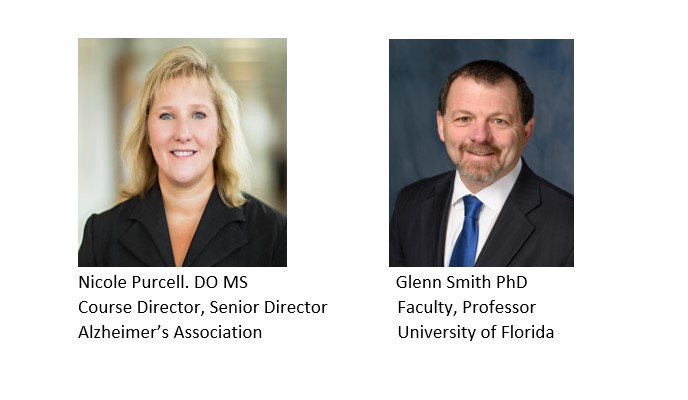Dementia Clinical Care Foundations (CME, CNE, Social Work CE, Pharmacy CEUs)
TITLE: Dementia Clinical Care Foundations (CME, CNE, Social Work CE, Pharmacy CEUs)
Activity Available: 10/27/2023 – 10/27/2026
Education Activity Description: This three-part video series will address core concepts of dementia care Including: (1) Screening (2) Diagnosis and Treatment and (3) Person-Centered Approaches to Dementia Behavior Management
Jointly provided by Postgraduate Institute for Medicine and Alzheimer’s Association
Estimated time to complete activity: Approximately 145 minutes (3-modules) .75 credits per module
Learning Objectives:
Module 1 Introduction and Screening for Dementia
- Explore the benefits of early diagnosis.
- Recognize the difference between typical aging, MCI, and Alzheimer’s disease
- Describe the cognitive screening process
- Determine common risk factors for cognitive impairment
Module 2 Diagnosis and Treatment of Dementia
- Explain the diagnostic process for an advanced workup
- Discuss pharmacological and non-pharmacological treatments
- Explore the latest in fluid and imaging biomarkers
- Consider co-morbidities in the management of dementia
Module 3 Person-Centered Approaches to Dementia Behavior Management
- Identify communication changes that occur throughout the disease process
- List the behavioral and psychological symptoms of dementia
- Consider alternatives to pharmacological approaches to behavior management
Faculty

For questions contact: education@alz.org
Accreditation Information:
Disclosure of Unlabeled Use: This educational activity may contain discussion of published and/or investigational uses of agents that are not indicated by the FDA. The planners of this activity do not recommend the use of any agent outside of the labeled indications. The opinions expressed in the educational activity are those of the faculty and do not necessarily represent the views of the planners. Please refer to the official prescribing information for each product for discussion of approved indications, contraindications, and warnings.
Disclaimer: Participants have an implied responsibility to use the newly acquired information to enhance patient outcomes and their own professional development. The information presented in this activity is not meant to serve as a guideline for patient management. Any procedures, medications, or other courses of diagnosis or treatment discussed or suggested in this activity should not be used by clinicians without evaluation of their patient's conditions and possible contraindications and/or dangers in use, review of any applicable manufacturer's product information, and comparison with recommendations of other authorities.
Target Audience: This activity is intended to meet the educational needs of primary care clinicians including internists, family physicians, radiologists, neurologists, nurse practitioners and physician assistants who are seeking additional education in the assessment, diagnosis and ongoing health care of patients with cognitive impairment and dementia.
Statement of Purpose: A practice gap is the difference between what healthcare professionals should or could be doing and what they are currently doing. Using current evidence based to bridge the gap between patient care and care recommendation, ensuring healthcare professionals are not only aware of current practice but are utilizing them in patient care settings. This will be accomplished by increasing awareness and knowledge of new guidelines on the impact that physical activity, diabetes and obesity, vascular risk, and tobacco use can have on brain health/cognition.
 Joint Accreditation Statement
Joint Accreditation Statement
In support of improving patient care, this activity has been planned and implemented by the Postgraduate Institute for Medicine and Alzheimer's Association. Postgraduate Institute for Medicine is jointly accredited by the Accreditation Council for Continuing Medical Education (ACCME), the Accreditation Council for Pharmacy Education (ACPE), and the American Nurses Credentialing Center (ANCC), to provide continuing education for the healthcare team.
Credit Designations:
Physician Continuing Medical Education; The Postgraduate Institute for Medicine designates this enduring material for a maximum of .75 AMA PRA Category 1 Credit(s)™ per module. Physicians should claim only the credit commensurate with the extent of their participation in the activity.
Continuing Nursing Education: The maximum number of hours awarded for this Continuing Nursing Education activity is .75 contact hours. This activity is being presented without bias and without commercial support.
Continuing Social Work Education: As a Jointly Accredited Organization, Postgraduate Institute for Medicine is approved to offer social work continuing education by the Association of Social Work Boards (ASWB) Approved Continuing Education (ACE) program. Organizations, not individual courses, are approved under this program. State and provincial regulatory boards have the final authority to determine whether an individual course may be accepted for continuing education credit. Postgraduate Institute for Medicine maintains responsibility for this course. Social workers completing this course receive .75 clinical continuing education credits.
Continuing Pharmacy Education: Postgraduate Institute for Medicine designates this continuing education activity for .75 contact hour(s) (0.075 CEUs) of the Accreditation Council for Pharmacy Education.
(Universal Activity Number -
Type of Activity: Application
Faculty Disclosures:

